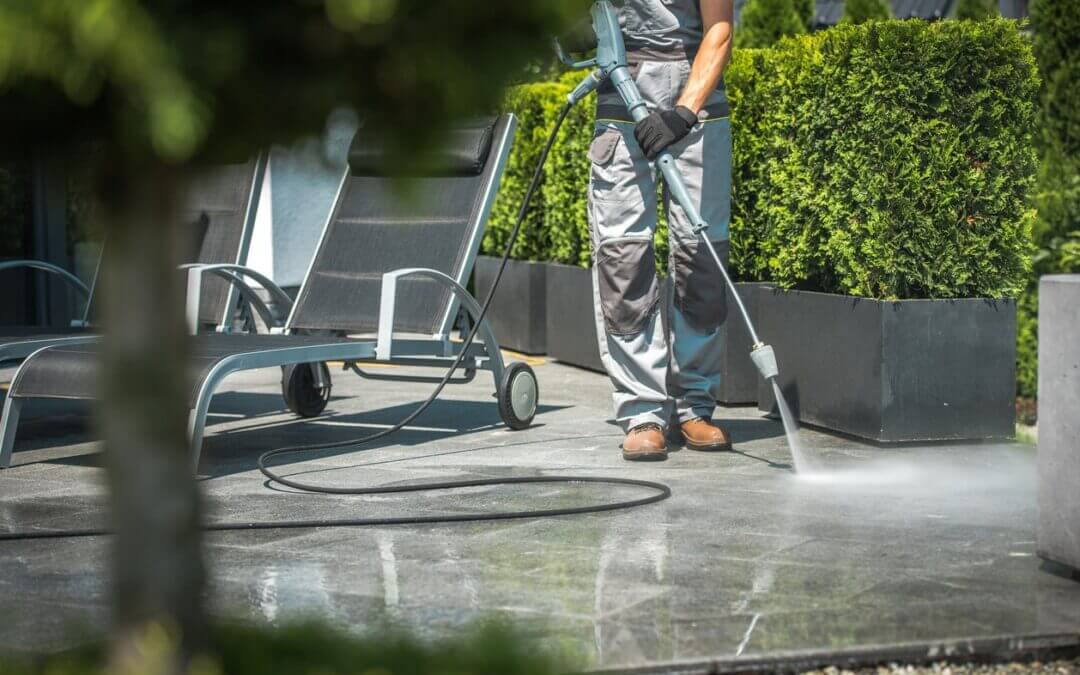How to Clean Concrete - The Ultimate Guide

Concrete is a popular choice for basement floors, patios, and roads since it is long-lasting, low-maintenance, and cost-effective.
However, your concrete driveway may not look as good as it did after when it was installed. Stains and spills will inevitably occur, ruining the appearance of your concrete surface no matter how careful you are.
Fortunately, there are many methods for removing stains and maintaining the appearance of your concrete.
Read on for advice on cleaning concrete as well as some pointers on how to work with this rigid, long-lasting material. This guide will help remove grease and oil stains, rust stains, mildew, and most food stains from your concrete surface.
Five Steps for Cleaning Concrete
Here we discuss five steps for cleaning concrete.
1. Gather Supplies
This is a list of what you might need, not necessarily what you will need. The cleaning supplies you end up using will be determined by the appropriate cleaning method for your situation.
- A leaf blower, broom, or vacuum
- Stiff bristle brush
- Laundry detergent
- Baking Soda
- Safety goggles
- Pressure washer
- White vinegar
- Spray bottle
If you are short on supplies or can’t just muster enough willpower to shop for them in the store, you always have the option of reaching out to our professional house cleaning service in Stoneham, MA. We are never short on cleaning tools and products for every situation.
2. Remove Debris and Loose Dirt
Sweep or vacuum loose dirt from your concrete surface unless you have mold or mildew problems in your basement.
While cleaning a patio or driveway, exterminate any weeds that may have infiltrated crevices.
3. Spot Treat Stains
Using liquid laundry detergent and water to spot-treat stains is a very cost-effective approach. Scrub the area with a firm nylon brush after pouring the soap straight into the stain (avoid wire-bristle brushes as metal can damage concrete). Let it dry after rinsing with water.
4. Repeat, If Required
If the stain remains, add white vinegar and water, or baking soda and water, to your cleaning solution and attack the stain again. Rinse it thoroughly with a bucket of water or a garden hose.
5. Use a Pressure Washer
if the stain remains, use a pressure washer. You can purchase attachments to transform your garden hose into a power washer or rent a machine from your local hardware store.
If you decide to rent a machine, take special care when increasing the pressure to avoid damaging the concrete. Remember to wear safety goggles and protect windows, plants, and other valuables from the water pressure.
Dealing with Common Concrete Stains
Here are some common concrete stains and how to deal with them.
Grease and Oil Stains
Sprinkle sawdust, cornmeal, or baking soda immediately on the oil stain to absorb as much as possible. Brush away any remaining powder with a broom once the spill has been absorbed.
If the stain lingers, add more baking soda (or powdered laundry detergent if you don’t have any) and scrub the area with a nylon brush and a small amount of water. Use a degreaser to help remove any remaining grease stains or if the oil stain is old or has infiltrated the surface. Make sure you follow the manufacturer’s instructions.
Rust Stains
White vinegar, combined with a little scrubbing with a brush, is an effective, eco-friendly way to remove rust stains from concrete, even if it is decades old. Pour the white vinegar straight on the stain, wait 20 minutes for it to soak in, then clean with a stiff-bristled brush.
Then, using clean water, thoroughly cleanse the area. Let it dry. Repeat if necessary. If the stain remains, use commercial concrete rust removing product.
Mildew, Mold, and Water Stains
Use a pressure washer or hose to remove water, mold, or mildew stains from concrete patios and driveways. If the stains remain, make a bleach solution with one gallon of hot water and scrub the area with a brush, first wetting down nearby foliage to minimize runoff damage. Rinse thoroughly with clean water.
On the other hand, if you have a mold or mildew problem on your basement floor, don’t sweep it up since you’ll disperse mold spores all over the place, making the situation worse.
During cleaning, open any windows and allow fresh air to flow. Spray the affected area with a mold-killing detergent and water solution, scrub the area with a brush, and then rinse with a clean wet mop.
Examine the area once it is dry to check whether you need to repeat the process.
Food and Beverage Stains
You can use a basic mix of water and dishwashing solutions to remove stains caused by food and drinks. Scrub this solution with a firm brush onto the stained surface. After that, thoroughly rinse the area with clean water to remove any soapy residue.
Hiring a Professional vs. DIY?
Many property owners wonder if they should attempt concrete cleaning on their own or hire a professional service. You can achieve satisfactory results by using DIY approaches and some tools at your disposal. However, a professional cleaning service like HomePlus can pressure wash concrete floors in half the time and produce superior results.
Our house cleaning service in Stoneham, MA, has professionals who have the essential knowledge and experience to safely clean all types of concrete.
It can also be cheaper as you won’t have to rent or buy a pressure washer. If you try to pressure wash concrete on your own, you risk damaging it by using too much pressure.
For booking, press here!
